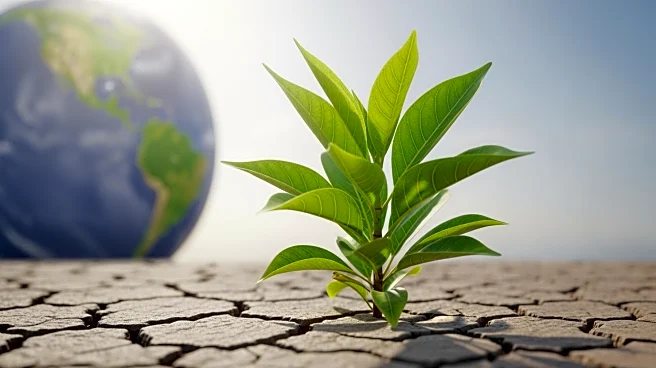What's Happening?
The Paris Climate Agreement, adopted in December 2015, aimed to unite nearly every country in the world to cut emissions to net zero by 2050, preventing catastrophic global warming. Despite initial optimism, the past decade has seen continued fossil fuel
pollution and climate disasters, such as hurricanes in Puerto Rico and Jamaica. The U.S. elected a climate-denier president twice, with President Trump recently dismissing climate change as a 'con job.' However, scientific understanding of climate threats has advanced, highlighting the urgency of the situation. The agreement's goal to limit warming to 1.5 degrees Celsius is now considered nearly unattainable, yet efforts to transition to renewable energy are accelerating.
Why It's Important?
The Paris Agreement represents a critical global effort to combat climate change, with significant implications for environmental policy and international cooperation. The continued rise in emissions poses severe risks to vulnerable regions, threatening ecosystems and human livelihoods. Despite setbacks, the transition to renewable energy sources like wind and solar is progressing faster than anticipated, offering hope for reducing reliance on fossil fuels. Public support for climate action remains strong, with a majority favoring stricter regulations and international agreements. The ongoing dialogue and initiatives, such as the proposed Fossil Fuel Nonproliferation Treaty, underscore the importance of sustained global commitment to addressing climate change.
What's Next?
The upcoming COP30 in Brazil will be a pivotal moment for international climate negotiations, as delegates aim to reinforce commitments to reducing emissions and transitioning to clean energy. The proposed Fossil Fuel Nonproliferation Treaty seeks to hold nations accountable for curbing climate-heating pollution, building on recent legal precedents. Continued advocacy and public engagement are crucial to maintaining momentum and ensuring that climate policies align with scientific recommendations. The global community must navigate the challenges of implementing effective climate strategies while balancing economic and social considerations.
Beyond the Headlines
The Paris Agreement's legacy highlights the complex interplay between political will, scientific evidence, and public perception in shaping climate policy. The ethical responsibility to protect vulnerable communities and ecosystems from climate impacts remains a central concern. Long-term shifts in energy production and consumption patterns are essential for achieving sustainable development goals. The role of media and advocacy groups in raising awareness and mobilizing action is increasingly important in fostering a collective response to the climate crisis.
















